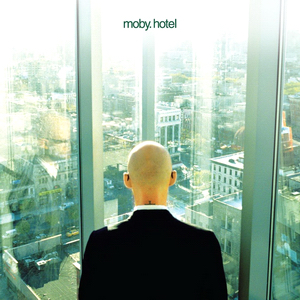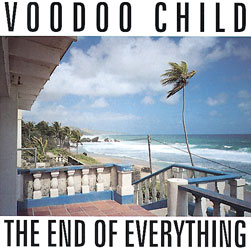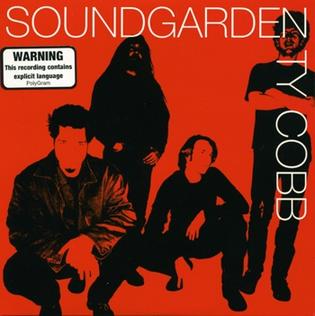
Richard Melville Hall, known professionally as Moby, is an American musician, songwriter, singer, producer, and animal rights activist. He has sold 20 million records worldwide. AllMusic considers him to be "among the most important dance music figures of the early 1990s, helping bring dance music to a mainstream audience both in the United States and the United Kingdom".

Soundgarden was an American rock band formed in Seattle, Washington, in 1984 by singer and drummer Chris Cornell, lead guitarist Kim Thayil, and bassist Hiro Yamamoto; Cornell switched to rhythm guitar in 1985, replaced on drums initially by Scott Sundquist, and later by Matt Cameron in 1986. Yamamoto left in 1990 and was replaced initially by Jason Everman and shortly thereafter by Ben Shepherd. The band dissolved in 1997 and re-formed in 2010. Following Cornell's death in 2017 and a year of uncertainty regarding the band's future, Thayil declared in October 2018 that Soundgarden had disbanded once again, though they did reunite in January 2019 for a one-off concert in tribute to Cornell.

Green Day is an American rock band formed in the East Bay of California in 1987 by lead vocalist and guitarist Billie Joe Armstrong, together with bassist and backing vocalist Mike Dirnt. For most of the band's career, they have been a power trio with drummer Tré Cool, who replaced John Kiffmeyer in 1990 before the recording of the band's second studio album, Kerplunk (1991). Touring guitarist Jason White became a full-time member in 2012, but returned to his touring role in 2016. Before taking its current name in 1989, Green Day was called Sweet Children, and they were part of the late 1980s/early 1990s Bay Area punk scene that emerged from the 924 Gilman Street club in Berkeley, California. The band's early releases were with the independent record label Lookout! Records. In 1994, their major-label debut Dookie, released through Reprise Records, became a breakout success and eventually shipped over 10 million copies in the U.S. Alongside fellow California punk bands Bad Religion, the Offspring, Rancid, NOFX, Pennywise and Social Distortion, Green Day is credited with popularizing mainstream interest in punk rock in the U.S.

Superunknown is the fourth studio album by American rock band Soundgarden, released on March 8, 1994, through A&M Records. It is the band's second album with bassist Ben Shepherd, and features new producer Michael Beinhorn. Soundgarden began work on the album after touring in support of its previous album, Badmotorfinger (1991). Superunknown captured the heaviness of the band's earlier releases while displaying a more diverse range of influences.

Badmotorfinger is the third studio album by American rock band Soundgarden, released on October 8, 1991, through A&M Records. Soundgarden began the recording sessions for the album with new bassist Ben Shepherd in the spring of 1991. The album maintained the band's heavy metal sound, while featuring an increased focus on songwriting compared to the band's previous releases. AllMusic considered the album's music to be "surprisingly cerebral and arty"; alternative tunings and odd time signatures were present on several of the album's songs, and lyrics were intended to be ambiguous and evocative.

Down on the Upside is the fifth studio album by the American rock band Soundgarden, released on May 21, 1996, through A&M Records. Following a worldwide tour in support of its previous album, Superunknown (1994), Soundgarden commenced work on a new album. Self-produced by the band, the music on the album was notably less heavy and dark than the group's preceding albums and featured the band experimenting with new sounds.

Play is the fifth studio album by American electronic musician Moby. It was released on May 17, 1999, through Mute Records internationally and V2 Records in North America. Recording of the album began in mid-1997, following the release of Moby's fourth album, Animal Rights (1996), which deviated from his electronica style; Moby's goal for Play was to return to this style of music, blending downtempo with blues and roots music samples. Originally intended to be his final record, the album was recorded at Moby's home studio in Manhattan, New York.

Matthew David Cameron is an American musician who is the drummer for the rock band Pearl Jam. He first gained fame as the drummer for Seattle-based rock band Soundgarden, which he joined in 1986. He appeared on each of the band's studio albums until its break-up in 1997. In 1998, Cameron was invited to join Pearl Jam's U.S. Yield Tour and then became a permanent member of the band. In 2010, Cameron became simultaneously a member of Pearl Jam and the reunited Soundgarden. He remained with Soundgarden until its disbandment after the death of lead singer Chris Cornell in 2017. Cameron, along with guitarist Kim Thayil and Cornell, is one of three members to feature on every Soundgarden studio album.

Hotel is the seventh studio album by American electronica musician, singer, songwriter, and producer Moby. It was released on March 14, 2005, internationally by Mute Records and on March 22, 2005, in the United States by V2 Records. The album marked a stylistic shift from electronic and dance-oriented music towards alternative rock and Moby's decision not to use vocal sampling for the first time since his 1993 album Ambient.

The End of Everything is the second studio album by Voodoo Child, a pseudonym of American electronica musician Moby. It was released in July 1996 by record labels Trophy, Mute and Elektra.

Everything Is Wrong is the third studio album by American electronica musician Moby, released on March 14, 1995 by record labels Mute in the United Kingdom and Elektra in the United States. It was released with a limited-edition bonus disc of ambient music titled Underwater.

"Blow Up the Outside World" is a song by the American rock band Soundgarden. Written by frontman Chris Cornell, "Blow Up the Outside World" was released on November 18, 1996, as the third single from the band's fifth studio album, Down on the Upside (1996). The song topped the Billboard Mainstream Rock Tracks chart, where it spent a total of four weeks at number one. The song was included on Soundgarden's 1997 greatest hits album, A-Sides.
Hater was an American rock supergroup that formed in Seattle, Washington in 1993. The band formed as a side project mostly under the direction of Soundgarden bassist Ben Shepherd. Additional members included Soundgarden drummer Matt Cameron, guitarist John McBain, bassist John Waterman for the self-titled album, Devilhead vocalist Brian Wood, brother of Mother Love Bone vocalist Andrew Wood, and Alan Davis on bass for The 2nd.
Michael Beinhorn is a North American record producer, composer, author and musician. He has produced albums for Red Hot Chili Peppers, Soundgarden, Hole, Violent Femmes and Marilyn Manson.

The discography of Soundgarden, an American rock band, consists of six studio albums, two live albums, six compilation albums, eight extended plays, 24 singles and 23 music videos.

"Ty Cobb" is a song by the American rock band Soundgarden. Featuring lyrics written by frontman Chris Cornell and music written by bassist Ben Shepherd, "Ty Cobb" was released in April 1997 as the fourth single from the band's fifth studio album, Down on the Upside (1996). The song was included on Soundgarden's 1997 greatest hits album, A-Sides.

The discography of American musician Moby consists of twenty-one studio albums, one live album, twelve compilation albums, eleven remix albums, three video albums, four extended plays, seventy-two singles, ninety-six music videos, and four remixes.

Wait for Me is the ninth studio album by American electronica musician Moby. It was released on June 29, 2009 by Little Idiot and Mute.

Destroyed is the tenth studio album by American electronica musician Moby, released on May 13, 2011 by record labels Little Idiot and Mute.

King Animal is the sixth and final studio album by American rock band Soundgarden—their first in sixteen years. Produced by both the band and Adam Kasper, it was released on November 13, 2012, by Seven Four Entertainment and Republic Records in the United States, and by Vertigo Records in the rest of the world. It was the first of Soundgarden's albums not to be released on A&M Records since 1988's Ultramega OK, though Republic, Vertigo, and A&M are all owned by Universal Music Group. The album was the final studio album released by Soundgarden before the death of frontman Chris Cornell in 2017 and the subsequent dissolution of the band in 2018.

















